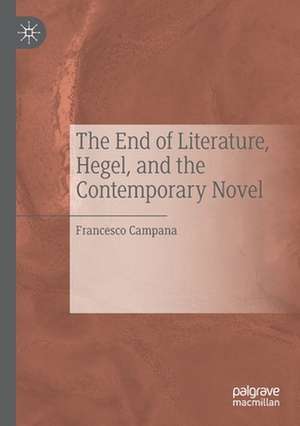The End of Literature, Hegel, and the Contemporary Novel
Autor Francesco Campanaen Limba Engleză Paperback – 31 dec 2020
Unlike other arts, which have experienced significant fractures in the contemporary world, Campana proposes that literature has always known how to renew itself in order to retain its distinguishing features, so much so that in a way it has always come to terms with its own end. Analysing the distinct character of literature, this book proposes a new and original interpretation of the 'end ofart' thesis, showing how it can be used as a key conceptual framework to understand the contemporary novel.
| Toate formatele și edițiile | Preț | Express |
|---|---|---|
| Paperback (1) | 445.03 lei 6-8 săpt. | |
| Springer International Publishing – 31 dec 2020 | 445.03 lei 6-8 săpt. | |
| Hardback (1) | 521.20 lei 6-8 săpt. | |
| Springer International Publishing – 9 dec 2019 | 521.20 lei 6-8 săpt. |
Preț: 445.03 lei
Nou
Puncte Express: 668
Preț estimativ în valută:
85.21€ • 88.73$ • 70.70£
85.21€ • 88.73$ • 70.70£
Carte tipărită la comandă
Livrare economică 12-26 februarie
Preluare comenzi: 021 569.72.76
Specificații
ISBN-13: 9783030313975
ISBN-10: 3030313972
Pagini: 265
Ilustrații: XVI, 265 p. 1 illus.
Dimensiuni: 148 x 210 mm
Greutate: 0.37 kg
Ediția:1st ed. 2019
Editura: Springer International Publishing
Colecția Palgrave Macmillan
Locul publicării:Cham, Switzerland
ISBN-10: 3030313972
Pagini: 265
Ilustrații: XVI, 265 p. 1 illus.
Dimensiuni: 148 x 210 mm
Greutate: 0.37 kg
Ediția:1st ed. 2019
Editura: Springer International Publishing
Colecția Palgrave Macmillan
Locul publicării:Cham, Switzerland
Cuprins
Chapter 1: The End of Art and the Resistance of Literature.- Chapter 2: Literature and the Other Arts.- Chapter 3: The End of Literature.- Chapter 4: Philosophisation and Ordinariness.- Chapter 5: The Contemporary Novel after the End of Literature.- Chapter 6: Conclusions.-
Notă biografică
Francesco Campana is a postdoctoral fellow at the Istituto Italiano per gli Studi Filosofici in Naples, Italy, and a research assistant at the University of Padua, Italy. He has studied and worked in Padua, Jena, Bochum, New York, and Berlin.
Textul de pe ultima copertă
This book explores the concept of the end of literature through the lens of Hegel's philosophy of art. In his version of Hegel's 'end of art' thesis, Arthur Danto claimed that contemporary art has abandoned its distinctive sensitive and emotive features to become increasingly reflective. Contemporary art has become a question of philosophical reflection on itself and on the world, thus producing an epochal change in art history. The core idea of this book is that this thesis applies quite well to all forms of art except one, namely literature: literature resists its 'end'.
Unlike other arts, which have experienced significant fractures in the contemporary world, Campana proposes that literature has always known how to renew itself in order to retain its distinguishing features, so much so that in a way it has always come to terms with its own end. Analysing the distinct character of literature, this book proposes a new and original interpretation of the 'end of art'thesis, showing how it can be used as a key conceptual framework to understand the contemporary novel.
Caracteristici
Explores the concept of the end of literature through the lens of Hegel's philosophy of art Proposes a new and original interpretation of the 'end of art' thesis Presents a cross-disciplinary hypothesis that engages both philosophical and literary studies
